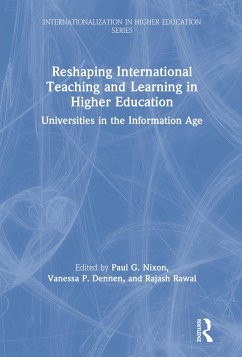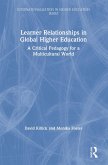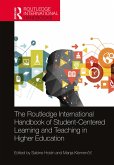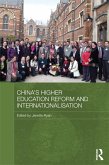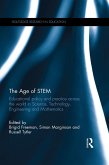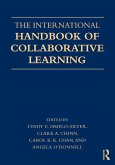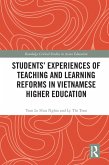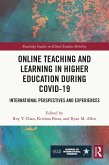Reshaping International Teaching and Learning in Higher Education (eBook, ePUB)
Universities in the Information Age
Redaktion: Nixon, Paul G.; Rawal, Rajash; Dennen, Vanessa P.
42,95 €
42,95 €
inkl. MwSt.
Sofort per Download lieferbar

21 °P sammeln
42,95 €
Als Download kaufen

42,95 €
inkl. MwSt.
Sofort per Download lieferbar

21 °P sammeln
Jetzt verschenken
Alle Infos zum eBook verschenken
42,95 €
inkl. MwSt.
Sofort per Download lieferbar
Alle Infos zum eBook verschenken

21 °P sammeln
Reshaping International Teaching and Learning in Higher Education (eBook, ePUB)
Universities in the Information Age
Redaktion: Nixon, Paul G.; Rawal, Rajash; Dennen, Vanessa P.
- Format: ePub
- Merkliste
- Auf die Merkliste
- Bewerten Bewerten
- Teilen
- Produkt teilen
- Produkterinnerung
- Produkterinnerung

Bitte loggen Sie sich zunächst in Ihr Kundenkonto ein oder registrieren Sie sich bei
bücher.de, um das eBook-Abo tolino select nutzen zu können.
Hier können Sie sich einloggen
Hier können Sie sich einloggen
Sie sind bereits eingeloggt. Klicken Sie auf 2. tolino select Abo, um fortzufahren.

Bitte loggen Sie sich zunächst in Ihr Kundenkonto ein oder registrieren Sie sich bei bücher.de, um das eBook-Abo tolino select nutzen zu können.
This volume provides a broad examination of how technology and globalisation have influenced contemporary higher education institutions and how moves towards internationalisation within and between educational providers continue to be a force for change in this context.
- Geräte: eReader
- ohne Kopierschutz
- eBook Hilfe
- Größe: 3.48MB
Andere Kunden interessierten sich auch für
![Learner Relationships in Global Higher Education (eBook, ePUB) Learner Relationships in Global Higher Education (eBook, ePUB)]() David KillickLearner Relationships in Global Higher Education (eBook, ePUB)39,95 €
David KillickLearner Relationships in Global Higher Education (eBook, ePUB)39,95 €![The Routledge International Handbook of Student-Centered Learning and Teaching in Higher Education (eBook, ePUB) The Routledge International Handbook of Student-Centered Learning and Teaching in Higher Education (eBook, ePUB)]() The Routledge International Handbook of Student-Centered Learning and Teaching in Higher Education (eBook, ePUB)45,95 €
The Routledge International Handbook of Student-Centered Learning and Teaching in Higher Education (eBook, ePUB)45,95 €![China's Higher Education Reform and Internationalisation (eBook, ePUB) China's Higher Education Reform and Internationalisation (eBook, ePUB)]() China's Higher Education Reform and Internationalisation (eBook, ePUB)46,95 €
China's Higher Education Reform and Internationalisation (eBook, ePUB)46,95 €![The Age of STEM (eBook, ePUB) The Age of STEM (eBook, ePUB)]() The Age of STEM (eBook, ePUB)60,95 €
The Age of STEM (eBook, ePUB)60,95 €![The International Handbook of Collaborative Learning (eBook, ePUB) The International Handbook of Collaborative Learning (eBook, ePUB)]() The International Handbook of Collaborative Learning (eBook, ePUB)137,95 €
The International Handbook of Collaborative Learning (eBook, ePUB)137,95 €![Students' Experiences of Teaching and Learning Reforms in Vietnamese Higher Education (eBook, ePUB) Students' Experiences of Teaching and Learning Reforms in Vietnamese Higher Education (eBook, ePUB)]() Tran Le Huu NghiaStudents' Experiences of Teaching and Learning Reforms in Vietnamese Higher Education (eBook, ePUB)41,95 €
Tran Le Huu NghiaStudents' Experiences of Teaching and Learning Reforms in Vietnamese Higher Education (eBook, ePUB)41,95 €![Online Teaching and Learning in Higher Education during COVID-19 (eBook, ePUB) Online Teaching and Learning in Higher Education during COVID-19 (eBook, ePUB)]() Online Teaching and Learning in Higher Education during COVID-19 (eBook, ePUB)42,95 €
Online Teaching and Learning in Higher Education during COVID-19 (eBook, ePUB)42,95 €-
-
-
This volume provides a broad examination of how technology and globalisation have influenced contemporary higher education institutions and how moves towards internationalisation within and between educational providers continue to be a force for change in this context.
Dieser Download kann aus rechtlichen Gründen nur mit Rechnungsadresse in A, B, BG, CY, CZ, D, DK, EW, E, FIN, F, GR, HR, H, IRL, I, LT, L, LR, M, NL, PL, P, R, S, SLO, SK ausgeliefert werden.
Produktdetails
- Produktdetails
- Verlag: Taylor & Francis eBooks
- Seitenzahl: 236
- Erscheinungstermin: 21. Februar 2021
- Englisch
- ISBN-13: 9781000343755
- Artikelnr.: 61277140
- Verlag: Taylor & Francis eBooks
- Seitenzahl: 236
- Erscheinungstermin: 21. Februar 2021
- Englisch
- ISBN-13: 9781000343755
- Artikelnr.: 61277140
- Herstellerkennzeichnung Die Herstellerinformationen sind derzeit nicht verfügbar.
Paul G. Nixon is a Principal Lecturer in Political Science at The Hague University of Applied Sciences, The Netherlands. Vanessa P. Dennen is a Professor of Instructional Systems and Learning Technologies at Florida State University, USA. Rajash Rawal is Vice President of The Hague University of Applied Sciences, The Netherlands.
Introduction PART I Digital learning and new technologies in the
internationalisation of higher education 1 New technological capabilities
and the societal, ethical, and legal tensions they create in today's
digital learning setting 2 Internationalisation in the classroom and
questions of alignment: Embedding COIL in an internationalised curriculum 3
Intercultural competences for all 4 Taking the distance out of distance
education: Increasing student engagement 5 Mediated identities, context
collapse, and cultural elements of networked learning 6 Intercultureality:
Making global education work in local contexts PART II Universities
reshaping teaching and learning through ICT use in different national
contexts 7 Is digital distance education a strategy for development?:
Exploring the digitization of distance education in Ghana 8 A pedagogical
sequence for the development of foreign language students' intercultural
competence 9 Social media's support for creativity, innovation, and
networked connections in higher education: A Thai perspective 10 Trust,
privacy, and self-disclosure on Facebook: Institutional implications of
social media use among American and Turkish students 11 "Dad, you are a
YouTuber!": A case for absence, silence, and variance in online video
lecturing 12 The international other in online learning: Four stories from
a graduate program 13 Learning to teach and to be a teacher: Brazil's "3rd
Space Program" and its implications for curriculum design 14 Engaging the
students' brain: Using documentaries to teach critical thinking Conclusion
internationalisation of higher education 1 New technological capabilities
and the societal, ethical, and legal tensions they create in today's
digital learning setting 2 Internationalisation in the classroom and
questions of alignment: Embedding COIL in an internationalised curriculum 3
Intercultural competences for all 4 Taking the distance out of distance
education: Increasing student engagement 5 Mediated identities, context
collapse, and cultural elements of networked learning 6 Intercultureality:
Making global education work in local contexts PART II Universities
reshaping teaching and learning through ICT use in different national
contexts 7 Is digital distance education a strategy for development?:
Exploring the digitization of distance education in Ghana 8 A pedagogical
sequence for the development of foreign language students' intercultural
competence 9 Social media's support for creativity, innovation, and
networked connections in higher education: A Thai perspective 10 Trust,
privacy, and self-disclosure on Facebook: Institutional implications of
social media use among American and Turkish students 11 "Dad, you are a
YouTuber!": A case for absence, silence, and variance in online video
lecturing 12 The international other in online learning: Four stories from
a graduate program 13 Learning to teach and to be a teacher: Brazil's "3rd
Space Program" and its implications for curriculum design 14 Engaging the
students' brain: Using documentaries to teach critical thinking Conclusion
Introduction PART I Digital learning and new technologies in the
internationalisation of higher education 1 New technological capabilities
and the societal, ethical, and legal tensions they create in today's
digital learning setting 2 Internationalisation in the classroom and
questions of alignment: Embedding COIL in an internationalised curriculum 3
Intercultural competences for all 4 Taking the distance out of distance
education: Increasing student engagement 5 Mediated identities, context
collapse, and cultural elements of networked learning 6 Intercultureality:
Making global education work in local contexts PART II Universities
reshaping teaching and learning through ICT use in different national
contexts 7 Is digital distance education a strategy for development?:
Exploring the digitization of distance education in Ghana 8 A pedagogical
sequence for the development of foreign language students' intercultural
competence 9 Social media's support for creativity, innovation, and
networked connections in higher education: A Thai perspective 10 Trust,
privacy, and self-disclosure on Facebook: Institutional implications of
social media use among American and Turkish students 11 "Dad, you are a
YouTuber!": A case for absence, silence, and variance in online video
lecturing 12 The international other in online learning: Four stories from
a graduate program 13 Learning to teach and to be a teacher: Brazil's "3rd
Space Program" and its implications for curriculum design 14 Engaging the
students' brain: Using documentaries to teach critical thinking Conclusion
internationalisation of higher education 1 New technological capabilities
and the societal, ethical, and legal tensions they create in today's
digital learning setting 2 Internationalisation in the classroom and
questions of alignment: Embedding COIL in an internationalised curriculum 3
Intercultural competences for all 4 Taking the distance out of distance
education: Increasing student engagement 5 Mediated identities, context
collapse, and cultural elements of networked learning 6 Intercultureality:
Making global education work in local contexts PART II Universities
reshaping teaching and learning through ICT use in different national
contexts 7 Is digital distance education a strategy for development?:
Exploring the digitization of distance education in Ghana 8 A pedagogical
sequence for the development of foreign language students' intercultural
competence 9 Social media's support for creativity, innovation, and
networked connections in higher education: A Thai perspective 10 Trust,
privacy, and self-disclosure on Facebook: Institutional implications of
social media use among American and Turkish students 11 "Dad, you are a
YouTuber!": A case for absence, silence, and variance in online video
lecturing 12 The international other in online learning: Four stories from
a graduate program 13 Learning to teach and to be a teacher: Brazil's "3rd
Space Program" and its implications for curriculum design 14 Engaging the
students' brain: Using documentaries to teach critical thinking Conclusion
